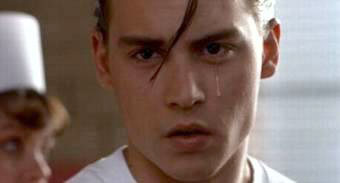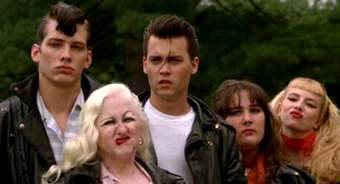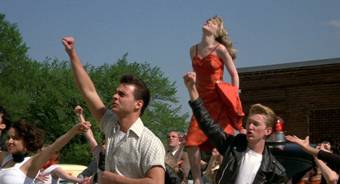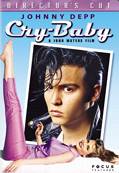If one were to draw up a list of qualifications that mark an outsider filmmaker (and I guess we, of all people, really should produce one), then pretty much top of the list would be this: Refuses to suppress or compromise their distinctive style to achieve mass popularity. As a result, outsider directors tend to be independents, rarely working within the studio system.
John Waters is unquestionably an outsider director, the William Burroughs-dubbed "Pope of Trash" whose early works were cheery celebrations of sometimes audience-baiting bad taste. With the passing of time, his films have become more technically accomplished and less confrontational, in the process alienating some hardcore fans of his early work, who smell a sell-out. Which is a pity, as there is still no-one out there making films like Mr. Waters, as he trots merrily through the genres, sending them up with a joyful disregard for the demands of mainstream cinema, on the way championing many of the things that society at large condemns as perverse. Oh yes, Waters is an outsider all right.

With that in mind, no-one can have been more surprised than the director himself when the script for his poke at teen movie musicals had major studios falling over each other to fund it. This would seem to suggest, of course, that for this one film Waters had reigned in the silliness, toned down the perversity, and delivered a film that was targeted at a wider demographic. John Waters goes mainstream, perhaps. Yeah, right. In a pig's eye.
The problem for some is that parody is only part of the mix on offer here – Waters also eagerly embraces elements of the films he is sending up, throws in twisted recollections of his own childhood, dollops of surrealistic peculiarity and camp humour, and creates characters that are connected to reality by the thinnest of threads. That they are recognisable threads actually adds to the problem when communicating with part of his potential audience, who may see Spider Man as an extension of what they dream of being, but are here presented with the very aspects of themselves that they would prefer to ignore, aspects that have been madly enhanced and openly celebrated.
So what's Cry-Baby about? Well, in 1950s rock 'n' roll era Baltimore, the teen world was divided into two opposing camps, the clean living, well-to-do Squares and the rowdy, outlandish Drapes. When Square girl Allison and Drape icon Wade 'Cry-Baby' Walker fall for each other, the cautious welcome expressed by Cry-Baby's gang is not shared by the Squares, who show their anger by declaring open war on the Drapes, and Cry-Baby in particular. Straightforward teen movie stuff, huh? Not quite...
Despite his fondness for the oddball, Waters is happy to have cool-looking characters in the lead, though will usually give them a trait that softens that status, at least in the eyes of any potential mainstream audience. Cry-Baby Walker is saddled from the start with a name that no would-be tough guy would wear so proud, and earns it with the single tear that escapes every time he falls victim to his own emotions. He is also unspeakably polite to Allison's mother, coming across at times as Marlon Brando in The Wild One crossed with Clark Kent as played by Christopher Reeve. Played with a glorious mix of sincerity and knowing absurdity by the young Johnny Depp, recently freed from the teen idol imagery of TV's 21 Jump Street and yet to earn his status as Hollywood's most consistently interesting male lead, this hybrid is a delight, a very funny exaggeration who also radiates cool, an iconic core around which Waters places a cheery collection of misfits whose very status as societal outsiders is key to their appeal. He is matched all the way by Amy Locane as Allison, who can shift from nice but weary straight girl ("I'm so tired of being good!") to red-hot sex bomb in a virtual eye-blink and completely sell both as authentic.

Even the very smallest role is played with unbridled and often madly energised enthusiasm, and Waters has assembled what could be his most extraordinary cast to date, with talk show fave Ricki Lake, controversial ex-porn queen Traci Lords, punk icon Iggy Pop, one-time kidnap victim and urban guerilla Patricia Hearst, and veteran performers Susan Tyrell and Polly Bergen. And yes, that's Willem Dafoe leering it up in a small role as the abusive prison guard. Almost every line is delivered with parodic gusto, and on energy alone the Square boys actually outdo their Drape rivals, singing and dancing like they've swallowed acid-laced happiness pills and talking like the up-tight establishment moralists from a retrospectively hilarious 1930s drug education film. Mind you, the most obviously John Waters created character belongs to Cry-Baby's gang in the form of the the aptly named Hatchet Face, probably the most unflattering bit of casting since poor old Reggie Nalder landed the role of Kurt Barlow in Salem's Lot because director Tobe Hooper wanted the ugliest actor he could find.
Given the project's parodic leanings, the biggest surprise is just how good the musical numbers are, Waters' ear for offbeat but appropriate tunes (the score is a mixture of found numbers and specifically composed songs) giving the film some real show stoppers, all of which are exuberantly performed and thrillingly choreographed to camera by Lori Eastside. And those fearing that a John Waters studio film might lack his notoriously perverse touches need not fear, as we are treated to a distraught Allison drinking a glass of her own collected tears, a French kiss montage that develops into semi-ludicrous tongue battling, Hatchet-Face's father dragging his iron lung-encased wife into court to berate his daughter, Iggy Pop bathing in an imitation of a well-known gay porn photo, Susan Tyrell throwing darts at the Queen's head, Ricki Lake suddenly giving unassisted birth in the back of a speeding car, and a musical number (the energetically bluesy Please Mr. Jailer) that is just one sheet of glass away from a lustful multi-racial orgy.

If the resolution is a little limp, the journey there is so energetic, so charged with a sense of gently anarchic fun, that this matters little. Cry-Baby may not go down in film history as a genuine classic, but it deserves at the very least to be an honorary footnote. It's very typical of its director in many ways, but more accessible for non-devotees than many of his films by way of its musical numbers, its lead performances, and its infectious sense of mischief. It's also a hugely enjoyable and fun-filled ride that celebrates society's outsiders and cheerfully turns standard notions of what constitutes normality and perversity on their heads.
The added bonus of this new DVD version is that it contains a genuine director's cut, restoring some previously excised scenes and removing two bleeps from a three-'fuck' joke – Waters was contractually required to deliver a PG-13 film, a rating that at the time only allowed one non-descriptive use of the word. Despite the continued absence of other (funny) scenes which Waters feels sabotage the narrative flow (they're included in extras), this must rank as the definitive version of the film.
| sound and vision |
Framed at 1.85:1 and anamorphically enhanced, there is a little grain visible and traces of edge enhancement are detectable, but on the whole this is a very nice transfer, sharp and clean with strong colour reproduction and well balanced contrast. Blacks are solid and shadow detail is fine, even in night scenes.
The sound is Dolby 2.0 stereo, and though a 5.1 remix would have been nice, this is still a very strong track, with good separation and splendid dynamic range during the musical numbers, which are full bodied and crystal clear.
| extra features |
As DVD special features go, I'm a sucker for a good commentary track – as someone who has been involved in film and video production myself on and off for many years, I am always enthralled by details of how productions came together, how scenes were shot, what problems were encountered and how they were overcome, and even anecdotal behind-the-scenes stories. That said, some directors are a lot more interesting to listen to than others, but few are more enjoyable than John Waters, whose sometimes outrageous sense of fun extends to the movie-making process itself and the people he clearly enjoys working with. The director's commentary here is a typically informative and entertaining Waters track, in which detailed background information on the actors is mixed with some extraordinary anecdotes, my favourite being Susan Tyrrell introducing herself to everyone, often loudly and in public, as "I'm Susan Tyrrell and I have the pussy of a twelve-year-old." Waters also handily talks about all of the restored scenes and why they were originally cut, plus the sequences he has chosen not to re-instate. The autobiographical background on the Squares and the Drapes (not a Waters invention but very much part of late 1950s Baltimore) is eye-opening, not least for the window it provides into Waters' own youth, and we are given a rare (if comical) glance at Waters' own surprise at changing times. "Girls are giving blow jobs in bathrooms," he remarks. "What happened to fingering?"
The retrospective documentary (it's listed on the box as a featurette, but it is way more substantial than that suggests) It Came From Baltimore (47:40) is a very detailed and engaging look at the genesis and making of the film, featuring interviews with Waters, cast and crew members, and writers on musical film history, plus a sprinkling of behind-the-scenes footage. Particularly enjoyable are the more anecdotal stories: Traci Lords cheerfully describing the cast and crew as "a camp of juvenile delinquents"; Waters hinting at the amount of partying that took place off set; Johnny Depp wistfully looking back on the shoot as "such a great time." The camaraderie of the company also comes across very positively, not least in the support offered for Lords when the FBI began closing in* and they all began sharing their personal arrest stories. A very enjoyable and substantial piece. The framing is 16:9 anamorphic.
There are five Deleted Scenes (7:03) that run one after the other without textual introduction or optional commentary, though they are also discussed in both the main commentary and the documentary. They range from an acrobatic performing child (who attended the premiere and was distraught to find that her big moment was missing) to a hilarious sequence in which Waters regular Alan Wendl lures Traci Lords to his photographic studio for a porn shoot, a scene that allowed Lords to kick back at her previous career. The most substantial missing sequence, however, is a full musical number (the madly energetic Chicken) that was cut from the climax and crops up in the documentary as a moment when a fight almost broke out between cast members after they got a little too deeply into their roles. All scenes are properly edited, mixed and scored, are anamorphic 1.85:1 and are of the same quality as the main feature.
| summary |
Cry-Baby was always one of Waters' most enjoyable and accomplished films, but the director's cut really does add to the already fine whole. A couple of years back fellow reviewer Camus and I worked with a Baltimore-based actress who told us that just about everyone in the Baltimore acting community was trying to get involved in the next John Waters project. On the basis of Cry-Baby and the background information presented on this disk, it's easy to see why.
The presentation on Universal's DVD (under the 'Focus Features' banner) is first rate, and though the extra features may not be numerous, they are all of a very high quality, and that's what counts. Cry-Baby fans will need no encouragement – this is the disk you have been waiting for.
* A veteran of somewhere between 80 to 100 porn movies, Lords was actually revealed to be under-age when she made many of them and was the subject of an investigation into the case while she was working on Cry-Baby, which she saw as her way out of the adult film industry.

